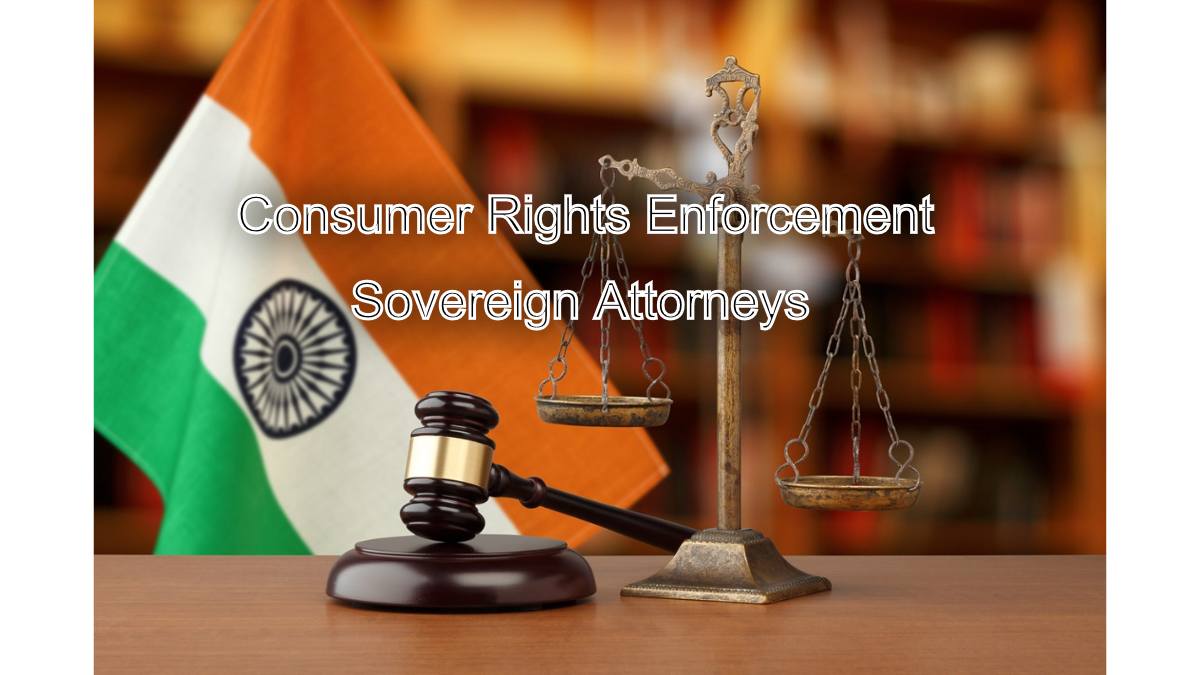Consumer Rights Enforcement: In today’s rapidly evolving marketplace, consumers in India face numerous challenges, from misleading advertisements and defective products to unfair trade practices and fraudulent schemes. Fortunately, consumer rights in India are well-protected by law, ensuring that individuals are not left defenseless against corporate malpractices. However, navigating the legal landscape to enforce these rights can often seem daunting. With the right knowledge and support, particularly through legal aid, consumers can effectively enforce their rights and hold businesses accountable.
Consumer Rights Enforcement: Legal Aid for Indians | Sovereign Attorneys
1. Understanding Consumer Rights in India
Consumer rights in India are designed to protect individuals from exploitation and ensure fair treatment in the marketplace. These rights are rooted in the Consumer Protection Act, 2019, which lays down comprehensive measures to safeguard consumers from fraudulent activities and unethical business practices.
The Six Consumer Rights
India’s Consumer Protection Act recognizes six fundamental consumer rights:
- Right to Safety: Protects consumers against hazardous goods and services.
- Right to be Informed: Ensures consumers are given full and accurate information before making a purchase.
- Right to Choose: Grants consumers the freedom to select from a variety of goods and services at competitive prices.
- Right to be Heard: Allows consumers to voice complaints and be assured that their grievances will be addressed.
- Right to Redress: Offers consumers the right to seek compensation or remedy for any harm caused by defective goods or unsatisfactory services.
- Right to Consumer Education: Ensures that consumers are informed about their rights and responsibilities, helping them make informed decisions.
These rights empower Indian consumers to make choices confidently, but their enforcement requires adequate legal frameworks and access to justice.
2. The Role of Legal Aid in Consumer Rights Enforcement
Legal aid is a crucial factor in ensuring the effective enforcement of consumer rights, especially for marginalized and vulnerable sections of society. Unfortunately, the complexity of legal procedures, coupled with the costs of litigation, often discourages consumers from pursuing justice. Legal aid bridges this gap by offering individuals the legal support they need to file complaints, represent their cases in court, and seek redressal without financial strain.
Importance of Legal Aid in India
Legal aid services, such as those provided by Sovereign Attorneys, help ensure that every consumer, regardless of their economic status, can access justice. By offering pro bono legal services or reduced-fee representation, legal aid makes consumer rights enforcement more accessible.
In cases of fraud, misleading advertisements, defective products, or unfair trade practices, lawyers specializing in consumer law can offer advice on the best course of action, draft complaints, and guide consumers through the judicial process. This support is crucial in ensuring that consumers are not taken advantage of due to their lack of legal knowledge or financial resources.
3. How to Enforce Consumer Rights in India
Enforcing consumer rights in India typically involves lodging a complaint and seeking legal redressal. The Consumer Protection Act, 2019, outlines several methods for enforcing consumer rights, including the establishment of a three-tiered consumer dispute redressal system.
Filing a Complaint
The first step for any consumer who has been wronged is to file a formal complaint. This complaint can be filed with a Consumer Forum or Consumer Commission, depending on the value of the claim. Complaints can be lodged for a variety of reasons, such as:
- Receiving defective products or substandard services.
- Misleading advertisements or deceptive practices.
- Overcharging or engaging in unfair trade practices.
- Denial of services or breach of warranty.
When filing a complaint, it’s essential to provide all necessary documentation, such as invoices, purchase receipts, and any correspondence with the business in question. Legal aid providers can assist in drafting a well-structured complaint and ensuring that all required information is included.
The Three-Tiered Consumer Dispute Redressal System
The Consumer Protection Act sets up a three-tier structure to handle consumer disputes, making the process more accessible and efficient for consumers across India.
1. District Consumer Disputes Redressal Commission
This body handles cases where the claim value is up to ₹1 crore. It is the first point of contact for consumers seeking redress for grievances at the district level.
2. State Consumer Disputes Redressal Commission
If the claim value exceeds ₹1 crore but is below ₹10 crores, consumers can approach the State Commission. Consumers can also appeal against decisions made by the District Commission here.
3. National Consumer Disputes Redressal Commission
The National Commission deals with cases where the claim exceeds ₹10 crores or where consumers want to appeal decisions made by the State Commission.
Having a lawyer guide you through these stages ensures that your case is presented clearly, increasing the likelihood of a favorable outcome.
4. Alternative Dispute Resolution for Consumer Cases
Not all consumer disputes need to go to court. In fact, Alternative Dispute Resolution (ADR) methods, such as mediation and arbitration, offer quicker and often less expensive ways to resolve disputes. Under the Consumer Protection Act, India introduced provisions for mediation to make dispute resolution more consumer-friendly.
Mediation: A Quicker Path to Justice
Mediation is a voluntary process where a neutral third party helps both the consumer and the business reach a mutually acceptable resolution. Many people prefer this method because it saves time, reduces legal costs, and avoids lengthy court processes.
Sovereign Attorneys provides legal aid services that represent consumers in mediation, ensuring they protect their rights throughout the process. Various consumer commissions across India have established mediation centers to facilitate smoother and faster resolution of disputes.
5. Challenges in Consumer Rights Enforcement
While India has a robust legal framework for protecting consumer rights, there are still challenges that many consumers face in seeking justice.
Lack of Awareness
One of the biggest challenges is the general lack of awareness among consumers about their rights and the mechanisms available to enforce them. Many consumers are unaware that they can file complaints or seek legal redress for grievances, leading to underutilization of consumer protection laws.
High Litigation Costs
The cost of legal representation can be prohibitive for many consumers, especially in cases that require prolonged litigation. Although legal aid services help to mitigate this challenge, the availability of free or low-cost legal assistance remains limited in certain regions.
Delays in the Legal System
India’s legal system is notorious for delays. Even though the Consumer Protection Act aims to expedite consumer cases, court backlogs and procedural delays can still prolong the resolution of disputes, discouraging many consumers from pursuing justice.
6. Sovereign Attorneys: A Lifeline for Consumers
At Sovereign Attorneys, consumer rights enforcement is not just a legal obligation but a mission to protect individuals from exploitation. With a team of experienced consumer law experts, Sovereign Attorneys provides comprehensive legal aid to help consumers understand and enforce their rights.
Legal Aid Services
Sovereign Attorneys offers a range of services, including:
- Complaint Drafting: Helping consumers prepare and file detailed complaints that outline their grievances.
- Representation in Consumer Courts: Offering legal representation at all levels of the consumer dispute redressal system, from District Commissions to the National Commission.
- Mediation and Negotiation: Assisting clients in resolving disputes outside of court through mediation or direct negotiation with businesses.
- Consumer Education: Sovereign Attorneys actively educates consumers about their rights through seminars, workshops, and informational resources.
With Sovereign Attorneys by your side, you can confidently protect your consumer rights and reach for justice.
FAQs related to “Consumer Rights Enforcement: Legal Aid for Indians”:
Under the Consumer Protection Act, 2019, Indian consumers are entitled to six basic rights:
Right to
Safety against hazardous goods and services.
Stay informed about the quality, quantity, and price of goods or services.
You can file a consumer complaint through a District, State, or National Consumer Disputes Redressal Commission, depending on the value of your claim. To file a complaint:
Collect all necessary documents like bills, contracts, or correspondence.
Legal aid provides crucial support by offering free or reduced-cost legal assistance to consumers, especially those unable to afford expensive litigation. Legal aid lawyers help file complaints, represent consumers in court, and offer guidance throughout the dispute resolution process, ensuring that all individuals, regardless of their financial situation, can seek justice.
If you cannot afford a lawyer, you can seek legal aid services from organizations like Sovereign Attorneys, which provide affordable or free legal assistance. You can also approach legal aid societies, public defenders, or pro bono lawyers who specialize in consumer law to help with your case.
India’s consumer disputes redressal system is a three-tier structure comprising:
District Consumer Disputes Redressal Commission: Handles claims up to ₹1 crore.
State Consumer Disputes Redressal Commission: Handles claims between ₹1 crore and ₹10 crores.
National Consumer Disputes Redressal Commission: Handles claims exceeding ₹10 crores and appeals from lower commissions.
This system allows consumers to resolve disputes based on the value of their claim efficiently.
Conclusion
Enforcing consumer rights in India is a critical aspect of maintaining fairness and accountability in the marketplace. With the Consumer Protection Act, 2019, India has a strong legal framework designed to protect individuals from exploitation and ensure that businesses act responsibly. However, legal aid is an essential component of consumer rights enforcement, particularly for those who may not have the financial means to pursue justice on their own.
Organizations like Sovereign Attorneys play a vital role in leveling the playing field by providing expert legal assistance to consumers in need. From helping file complaints to representing clients in consumer courts, legal aid services ensure that every consumer, regardless of their background or financial situation, has the opportunity to seek justice and hold wrongdoers accountable.
In a world where businesses wield significant power, legal aid serves as a shield. Protect consumers from harm and ensure they have a voice. By working together with legal experts, every Indian consumer can assert their rights. Contribute to a fairer, more equitable marketplace.
Read More
- Consumer Dispute Resolution: Legal Strategies for Success
- Legal Guidance on Product Defects: Know Your Rights
- Indian Consumer Forum: Your Gateway to Legal Assistance
- Legal Remedies for Consumer Fraud: Protect Yourself
- Empowering Indian Consumers: Legal Resources Available
- Department of Consumer Affairs


